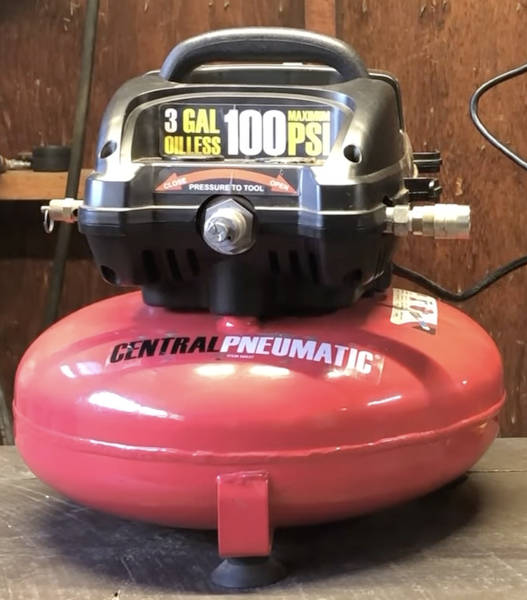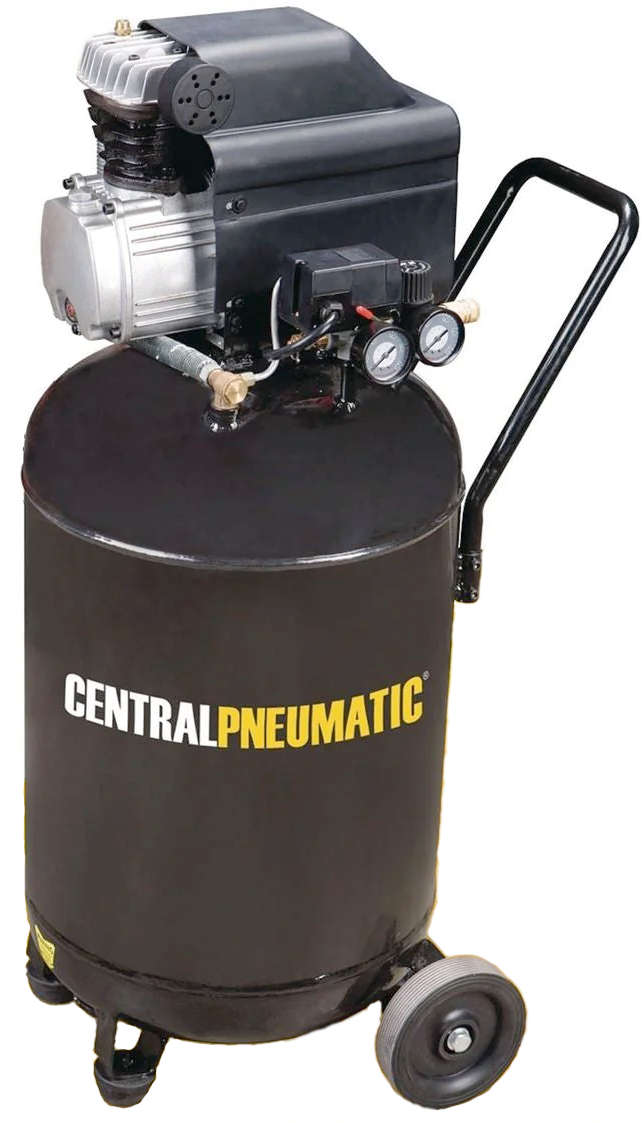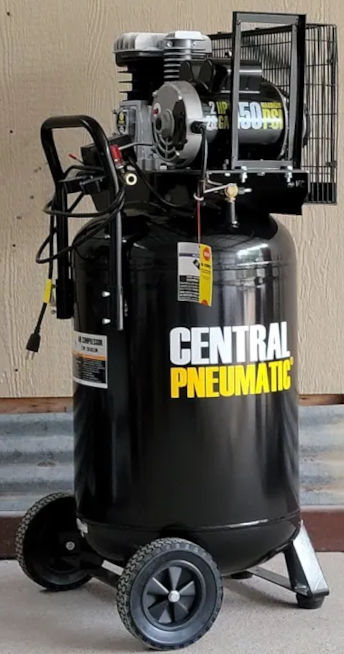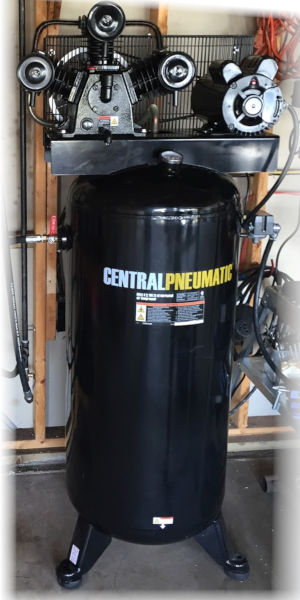Central Pneumatic Air Compressors are a popular choice for both DIY enthusiasts and professionals due to their affordable price, durability, and versatility. With a wide range of models available, it can be challenging to determine which one is right for you. This article aims to provide a comprehensive guide to Central Pneumatic air compressors, including an overview of the different models, customer reviews and ratings, safety tips, maintenance guidelines, and more. Whether you are a beginner or an experienced user, this article will provide you with everything you need to know to make an informed decision about your next air compressor purchase.
What is a Central Pneumatic Air Compressor?
Central Pneumatic is a brand of air compressors that are manufactured by Harbor Freight Tools, a company based in the United States. The country of origin for Central Pneumatic air compressors can vary depending on the model and production run. Central Pneumatic air compressors are manufactured in various countries, including China, Taiwan, and the United States. You can typically find the country of origin listed on the product packaging or in the product manual. If you have a specific model in mind, you can contact with the manufacturer or retailer to determine the country of origin for that particular air compressor.
Central Pneumatic air compressors are known for their affordability, durability, and versatility. They are available in a range of sizes, from small portable models to larger stationary units.
Types of Central Pneumatic air compressors include:
- Pancake air compressors: These are small and portable compressors that are easy to move around and store. They are ideal for light-duty tasks such as inflating tires or powering pneumatic tools like nail guns or staplers.
- Hot dog air compressors: These are similar to pancake compressors but are longer and narrower in shape, resembling a hot dog. They typically have a larger tank and are suitable for medium-duty tasks such as powering airbrushes or spray guns.
- Twin stack air compressors: These have two air tanks stacked vertically, which allows for more air storage and longer run times. They are suitable for heavier-duty tasks such as sanding or painting.
- Wheelbarrow air compressors: These have a horizontal air tank mounted on a wheelbarrow-style frame, which makes them easy to move around job sites. They are suitable for heavy-duty tasks such as powering jackhammers or sandblasters.
Lets take a closer look at the different Central Pneumatic air compressor models and their key features and specifications.
Central Pneumatic Air Compressor Models and Key Features
Central Pneumatic offers a wide range of air compressor models to suit different needs and budgets. In this section, we’ll take a closer look at some of the most popular Central Pneumatic air compressor models and their key features.
3 Gallon 1/3 HP 100 PSI Oil-Free Pancake Air Compressor
 This compact and portable air compressor is perfect for DIY projects around the house or garage. It features a 3-gallon tank capacity and a 1/3 horsepower motor that delivers up to 100 PSI of pressure. The oil-free pump design ensures easy maintenance and long-lasting durability, while the built-in handle and rubber feet make it easy to transport and use in a variety of settings.
This compact and portable air compressor is perfect for DIY projects around the house or garage. It features a 3-gallon tank capacity and a 1/3 horsepower motor that delivers up to 100 PSI of pressure. The oil-free pump design ensures easy maintenance and long-lasting durability, while the built-in handle and rubber feet make it easy to transport and use in a variety of settings.
21 Gallon 2.5 HP 125 PSI Oil-Free Vertical Air Compressor
 This larger air compressor is designed for heavier-duty tasks such as sanding, painting, or running air tools. It features a 21-gallon tank capacity and a 2.5 horsepower motor that delivers up to 125 PSI of pressure.
This larger air compressor is designed for heavier-duty tasks such as sanding, painting, or running air tools. It features a 21-gallon tank capacity and a 2.5 horsepower motor that delivers up to 125 PSI of pressure.
The oil-free pump design ensures easy maintenance and long-lasting durability, while the vertical design saves space in your workshop or garage.
29 Gallon 2 HP 150 PSI Cast Iron Vertical Air Compressor
 This powerful air compressor is built for professional use and features a 29-gallon tank capacity and a 2 horsepower motor that delivers up to 150 PSI of pressure. The cast iron construction ensures long-lasting durability and reliable performance, while the vertical design saves space in your workshop or garage.
This powerful air compressor is built for professional use and features a 29-gallon tank capacity and a 2 horsepower motor that delivers up to 150 PSI of pressure. The cast iron construction ensures long-lasting durability and reliable performance, while the vertical design saves space in your workshop or garage.
The built-in wheels and handle make it easy to move around job sites, while the industrial-style air regulator and pressure gauge provide precise control over the air flow.
60 Gallon 5 HP 165 PSI Two Stage Air Compressor
 This heavy-duty air compressor is built for professional use in automotive or industrial settings. It features a 60-gallon tank capacity and a 5 horsepower motor that delivers up to 165 PSI of pressure. The two-stage pump design delivers higher pressure and more air flow, making it ideal for running multiple air tools or powering large equipment. The cast iron construction and oversized flywheel ensure long-lasting durability and reliable performance, while the vertical design saves space in your workshop or garage.
This heavy-duty air compressor is built for professional use in automotive or industrial settings. It features a 60-gallon tank capacity and a 5 horsepower motor that delivers up to 165 PSI of pressure. The two-stage pump design delivers higher pressure and more air flow, making it ideal for running multiple air tools or powering large equipment. The cast iron construction and oversized flywheel ensure long-lasting durability and reliable performance, while the vertical design saves space in your workshop or garage.
Central Pneumatic Air Compressor Reviews and Ratings
Central Pneumatic air compressors have garnered a wide range of reviews and ratings from customers over the years. While some users have reported issues with certain models, others have praised the reliability and performance of their Central Pneumatic air compressors. In this section, we’ll take a look at some customer reviews and ratings to give you a better idea of what to expect from a Central Pneumatic air compressor.
Positive Reviews
Many customers have praised the affordability, reliability, and performance of their Central Pneumatic air compressors. Some users have reported using their air compressors for years without any issues, while others have noted the compact size and portability of certain models. Positive reviews have also noted the ease of use and maintenance of Central Pneumatic air compressors, with some users reporting that they were able to repair their air compressors themselves with minimal effort.
For example:
Martin says:
“I needed an air compressor for occasional use around the house and didn’t want to spend a lot of money. I went with the 3-gallon Central Pneumatic air compressor and it has been perfect for my needs. It’s small enough to store in my closet, but powerful enough to inflate tires and run my airbrush for painting. It’s also surprisingly quiet compared to other air compressors I’ve used in the past.”
Antony says:
“I purchased the 21-gallon Central Pneumatic Air Compressor for my small woodworking shop and have been thoroughly impressed with its performance. The motor is powerful enough to run my finish nailer and brad nailer without any issues, and the tank fills up quickly. I’ve had it for over a year now and haven’t had any problems with it. It’s also fairly lightweight and easy to move around my shop as needed.”
Negative Reviews
While many users have had positive experiences with their Central Pneumatic air compressors, some have reported issues with certain models. Common complaints include leaks, broken parts, and noisy operation. Some users have also noted that their air compressors did not last as long as they had hoped, or that they were unable to find replacement parts or repairs when needed.
Alex Cooper, says:
“I purchased the 29-gallon Central Pneumatic air compressor for my auto body shop and have had nothing but problems with it. It leaked air from day one, and the motor burned out within a few months. When I tried to get it repaired, I was told that replacement parts were unavailable. I ended up having to purchase a different brand of air compressor and wouldn’t recommend Central Pneumatic to anyone.”
L. Wilson says
“I bought the 60-gallon Central Pneumatic air compressor for my woodworking business and have been disappointed with its performance. It’s incredibly loud and vibrates so much that it shakes the entire shop. It also takes a long time to fill up the tank, and I’ve had issues with it overheating when I use it for extended periods of time. I wish I had spent a little more money on a higher-quality air compressor.”
Overall Ratings
Overall, Central Pneumatic air compressors have received mixed reviews and ratings from customers. Some models have earned high marks for their affordability and reliability, while others have been criticized for their quality and durability. If you’re considering a Central Pneumatic air compressor, it’s important to read reviews and do your research to ensure that you choose a model that will meet your needs and expectations.
Tips for Choosing the Right Central Pneumatic Air Compressor
Choosing the right Central Pneumatic air compressor for your needs can be challenging, especially with so many models to choose from. To help you make an informed decision, we’ve compiled a list of tips to consider when selecting an air compressor.
- Determine Your Needs
Before you start shopping for a Central Pneumatic air compressor, it’s important to determine what you’ll be using it for. Consider the types of tools you’ll be using with the air compressor, how often you’ll be using it, and the amount of space you have available for storage.
- Consider Tank Size
Central Pneumatic compressors come in a variety of tank sizes – from 3 gallons to 60 gallons or more. A larger tank size can provide more power and allow you to run tools for longer periods of time without needing to refill the tank, but it may also take up more space and be more expensive.
- Look at CFM Ratings
CFM (cubic feet per minute) is a measure of an air compressor’s airflow. The higher the CFM rating, the more power the air compressor can provide. When selecting an air compressor, be sure to consider the CFM rating and ensure that it is sufficient for your needs.
- Check for Portability
If you plan on moving your air compressor around frequently, consider models that are lightweight and easy to transport. Look for air compressors with built-in handles or wheels for easier mobility.
- Read Reviews
Before making a purchase, take the time to read reviews from other customers who have used the Central Pneumatic compressor you are considering. This can help you gain insights into the compressor’s performance, reliability, and any potential issues you may encounter.
By considering these tips, you can select a Central Pneumatic compressor that meets your needs and expectations. In the next section, we’ll wrap up our article with a summary of the key takeaways.
Maintenance and Troubleshooting
To ensure your Central Pneumatic air compressor lasts for years to come, it’s important to perform regular maintenance and troubleshoot any issues that may arise. Here are some tips for keeping your air compressor running smoothly:
- Check the Oil. Some Central Pneumatic air compressors require regular oil changes to keep the motor running smoothly. Check your owner’s manual for recommended oil types and change intervals.
- Clean the Air Filter. A dirty air filter can decrease the efficiency of your air compressor and cause it to overheat. Clean or replace the air filter regularly to prevent these issues.
- Inspect the Hoses. Check the air hoses for cracks or leaks and replace them as needed. Leaks can cause your air compressor to lose power and reduce its lifespan.
- Drain the Tank. Water can accumulate in the air tank and cause corrosion or damage to the tank. Drain the tank regularly to prevent this from happening.
Troubleshooting Common Issues
If you encounter any issues with your Central Pneumatic air compressor, try these troubleshooting tips before calling a repair technician:
- If the air compressor won’t turn on, check the power source and make sure it’s plugged in.
- If the air pressure is too low, check the air filter and hoses for clogs or leaks.
- If the air compressor is making unusual noises, check the motor and belts for damage or wear.
By performing regular maintenance and troubleshooting any issues that arise, you can keep your Central Pneumatic air compressor running smoothly and avoid costly repairs.
Central Pneumatic vs Other Brands
Central Pneumatic air compressors are not the only one option on the market as you know. There are many other brands available, each with its own unique set of features, pros, and cons. Let’s take a look at how Central Pneumatic compares to some of the other popular air compressor brands on the market.
CP vs Campbell Hausfeld
Campbell Hausfeld is a well-known brand that offers a variety of air compressors at different price points. Compared to Central Pneumatic, Campbell Hausfeld air compressors tend to be more expensive but are known for their quality and durability.
Pros:
- High-quality build
- Wide range of products
- Good customer support
Cons:
- More expensive than some other brands
- May not be the best option for occasional users
CP vs DEWALT
DEWALT is a popular brand that offers a wide range of power tools and accessories, including air compressors. DEWALT air compressors are known for their power and efficiency, making them a great option for heavy-duty use.
Pros:
- High-quality build
- High CFM ratings
- Wide range of products
Cons:
- More expensive than some other brands
- May be overkill for occasional users
CP vs Porter-Cable
Porter-Cable is a brand that offers a range of air compressors for various applications. Their air compressors tend to be more affordable than some other brands, making them a good option for those on a budget.
Pros:
- Affordable
- Wide range of products
- Good for occasional use
Cons:
- May not be as durable as some other brands
- Lower CFM ratings than some other brands
When selecting an air compressor brand, there are a few key factors to consider:
- Your budget: Air compressors can range in price from under $100 to several thousand dollars. Determine how much you’re willing to spend before you start shopping.
- Your needs: Consider what types of tools you’ll be using with the air compressor, how often you’ll be using it, and the amount of space you have available for storage.
- Customer support: Look for brands with good customer support and warranties to ensure that you’re covered if anything goes wrong.
Ultimately, the best air compressor brand for you will depend on your individual needs and preferences. By comparing brands and considering the key factors mentioned above, you can select an air compressor that meets your needs and expectations.
Conclusion: Is a Central Pneumatic Air Compressor Right for You?
In conclusion, Central Pneumatic air compressors are a reliable and affordable option for both occasional and regular users. With a range of models available, users can find a compressor that meets their specific needs and budget.
While there are other brands on the market, Central Pneumatic stands out for its affordability and ease of use. However, it’s important to consider your individual needs and preferences when selecting an air compressor brand, as different brands may offer unique features and benefits.
When it comes to maintaining and troubleshooting your Central Pneumatic air compressor, regular maintenance and cleaning can help to extend its lifespan and ensure optimal performance. If you experience any issues, troubleshooting steps such as checking for leaks and ensuring proper oil levels can often resolve the problem.
Overall, Central Pneumatic air compressors are a reliable and cost-effective choice for those in need of a versatile and powerful air compressor. With the right care and maintenance, a Central Pneumatic air compressor can provide years of reliable use.

I got this pancake air compressor 100psi from a friend an he could remember how the wires went an I was needing help wit a picture of how they go or the wiring do manual showing me how the wiring goes on this air compressor if you can plz plz plz help me wit this an thank you and God bless